The Off-payroll (IR35 Reforms) legislation has structural flaws that damage UK businesses, punish the flexible workforce, and impede UK growth.
ContractorCalculator is calling for the Government to either "fix or ditch" the legislation to reverse the damaging behavioural effect harming our flexible workforce.
Dave Chaplin, CEO of ContractorCalculator, who led the Stop the Off-payroll Tax Campaign, says: "There are known fundamental flaws within the legislation already acknowledged by the Treasury, which is causing severe harm to UK business. They need to be resolved immediately to help oil the wheels of the UK industry.
The most serious flaws result in double taxation, tax injustice, and impede access to natural justice for taxpayers. These effects are misaligned with conservative values and politically toxic for the incumbent Government, and won't help their re-election prospects."
So, what are the three major flaws in the off-payroll legislation?
Off-payroll flaw #1: Double-taxation
A fundamental tenet of the tax system is that earnings are not supposed to be taxed twice. However, due to a longstanding flaw known to HMRC and not corrected, contractors and firms can pay tax on the same money.
The resultant effect is that when HMRC step in and corrects firms' classification errors, firms receive tax bills up to four times more than they should.
A tax offsets mechanism is needed.
The double-taxation flaw was identified on 2 February 2022 by the National Audit Office in its report, Investigation into the implementation of IR35 tax reforms, and subsequently picked up by the Public Accounts Committee on 21 February 2022, who included the issue in their 11 May 2022 report, Lessons from implementing IR35 reforms, recommending that the structural problems needed addressing.
The Treasury confirmed on 5 December 2022, in its response to the PAC report, that it would ensure that "HMRC does not end up taxing the same income twice." Unfortunately, Treasury didn't commit to a timescale. Parliament needs to act now.
Off-payroll flaw #2: Tax injustice for recruiters
A recruitment agency can get landed with another firm's crippling tax bill, even though they did nothing wrong. A simple fix can resolve this anomaly.
The legislative changes introduced in April 2021, as part of the rollout to the private sector, included the concept of a "Status Determination Statement" or "SDS", which is a document the hirer can create and pass to the worker and other parties in the supply chain, for example, a recruitment agency. For the SDS to be valid, reasonable care must have been taken to reach the conclusions and contain reasons for that conclusion.
The purpose of the document was two-fold. If the determination was "Inside IR35", meaning the earnings must be taxed like employment, and the document is passed on, it makes the agency liable for the tax. The provision is entirely fair and designed to prevent moral hazard where agencies ignore the opinion and pay monies gross to the contractor.
However, this movement of the tax risk also occurs if the determination is "Outside IR35", meaning that if HMRC later intervenes and claims the determination was reached with reasonable care but is still wrong, the agency is liable for the tax bill. Given the agency had no cogency over the original status decision nor made it, this is absurd.
Parliament can make a minor amendment to the legislation to fix this glaring error.
Off-payroll flaw #3: Toothless appeals
Firms considering a self-employed person's tax status are neither required to provide detail in the Status Determination Statement nor is there an independent appeal route for the taxpayer.
In the original consultation documents by HMRC, it was proposed that taxpayers would have an appeal route, via HMRC, and ultimately the tax tribunals, to appeal what they considered an incorrect status classification by the hirer. That would have been fair.
However, the plan never came to fruition and instead was replaced by a "Client-led Dispute Process" included in the legislation. This fails because hiring firms are asked to mark their homework and don't change their minds.
Further, many firms are issuing "Status Determinations Statements" that purport to include "reasons" to make them valid, but those "reasons" are high-level vague nonsense, leaving nothing for the taxpayer to consider.
Firstly, a simple amendment could require firms to provide all the information about the working arrangements used in the determination. Secondly, HMRC should be set up in conjunction with independent oversight. This status review appeal service could be used by both firms and hirers, whereby any decision released by HMRC is legally binding.
How else could Off-payroll be made fairer?
There are two other areas which require attention:
- HMRC guidance / CEST: HMRC's Check Employment Status for Tax (CEST) is misaligned with the binding legal principles from the Court of Appeal decision from April 2022. It must be fixed or removed.
- Bad policing: Disputes with HMRC result in too many innocent taxpayers being unnecessarily put through the tribunal wringer. Better processes and independent oversight are needed.
ACTION: What can you do?
ContractorCalculator urges contractors, agencies and firms to get behind the "Fix it or Ditch it" campaign by writing to their MP.
You can locate your MP and find their email address here:
https://members.parliament.uk/FindYourMP
Please write to them, explain how Off-payroll affects you and your business, and share our one page "Fix it or ditch it" PDF.

